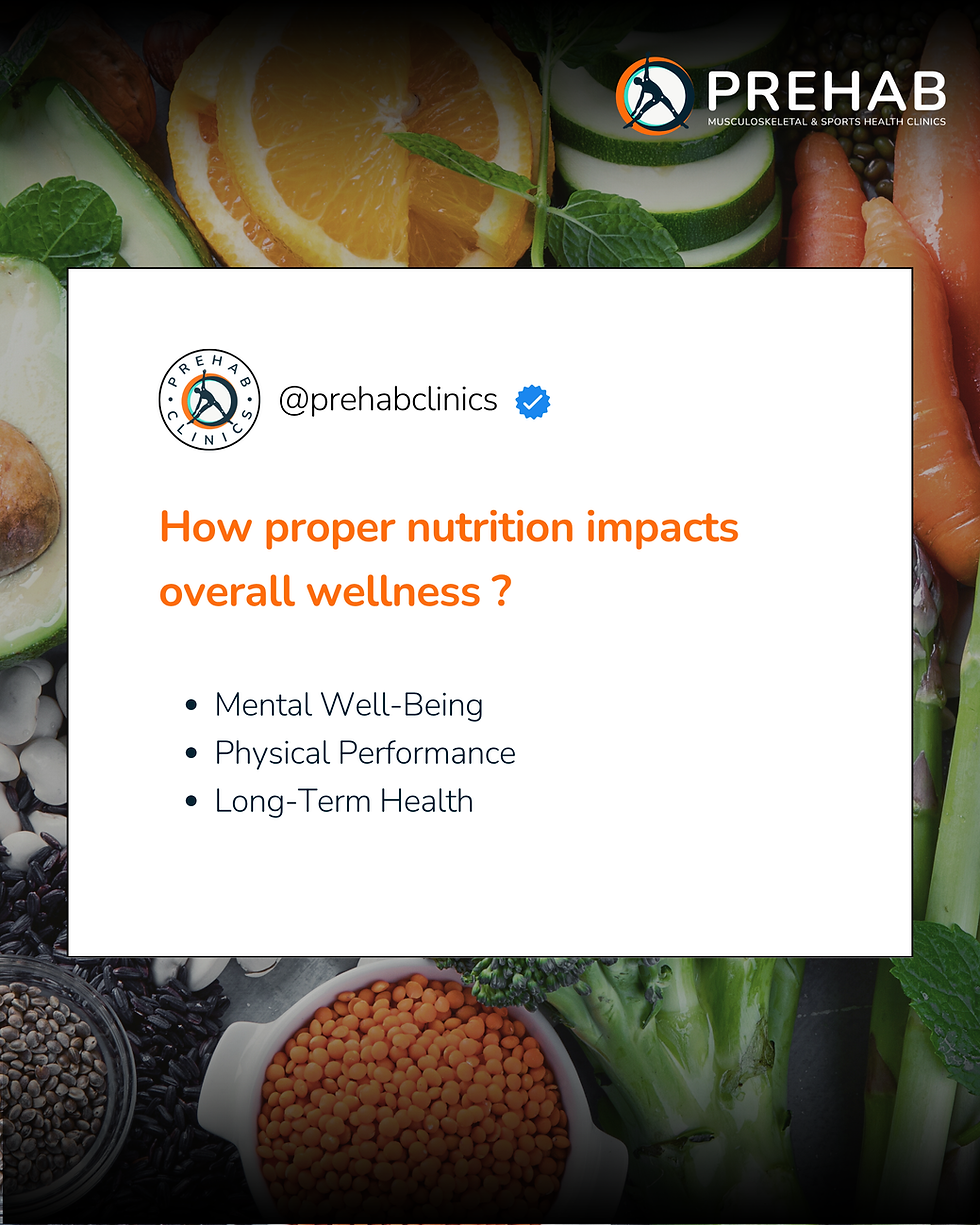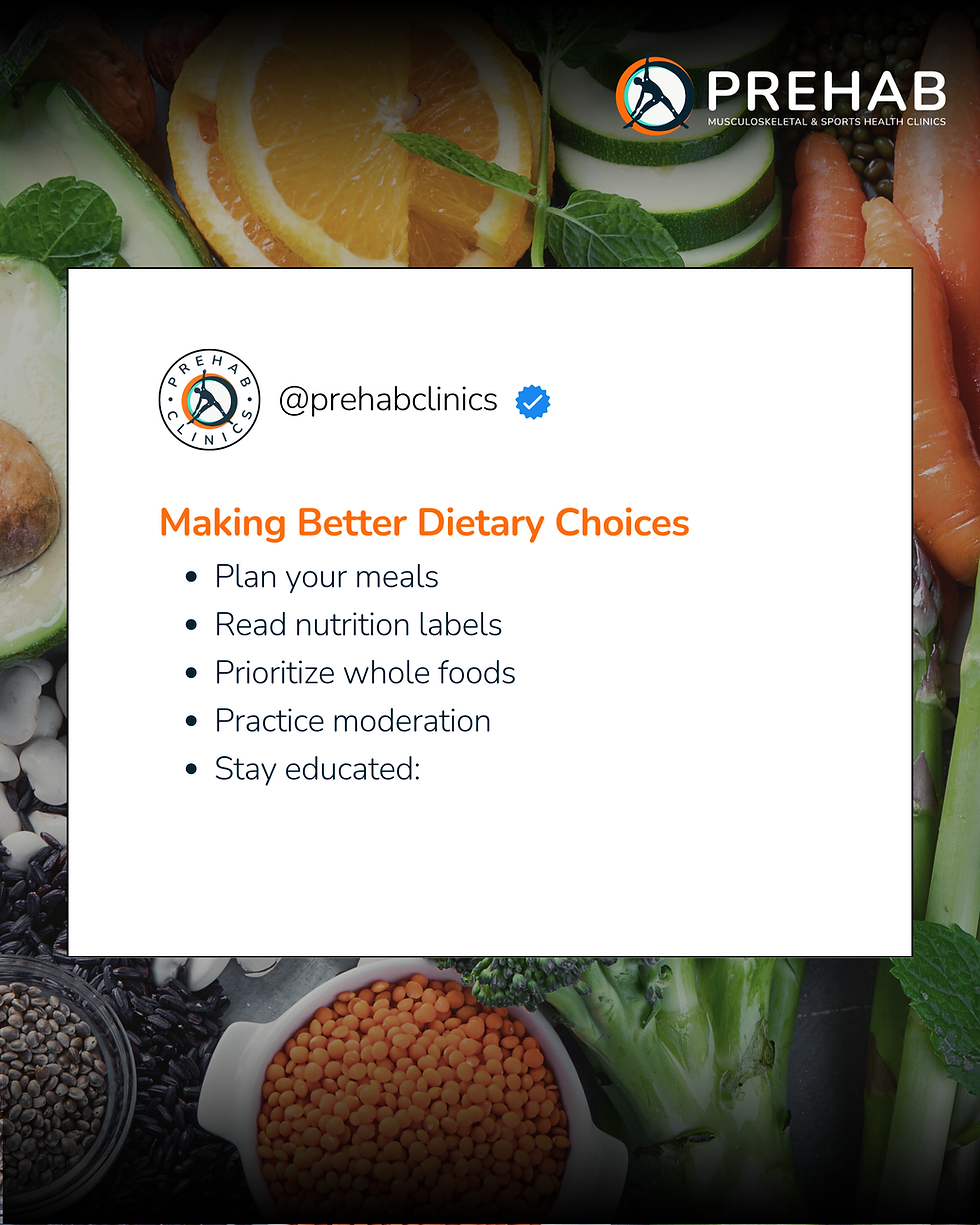How proper nutrition impacts overall wellness?
- Prehab Healthcare
- Jun 6, 2025
- 3 min read
Updated: Nov 13, 2025
In today's fast-paced world, the significance of proper nutrition often gets overlooked. However, understanding how a well-balanced diet can enhance overall wellness is essential for leading a healthy lifestyle. This blog post delves into the various ways proper nutrition influences our well-being, providing actionable tips and insights to help you make better dietary choices.
The role of nutrition in health
Nutrition plays a crucial role in maintaining optimal health. A diet rich in essential nutrients fuels our bodies and enhances our physical and mental capabilities. Research shows that individuals who consume a balanced diet are less likely to suffer from chronic illnesses such as obesity, diabetes, and heart disease.
Proper nutrition is not just about avoiding harmful foods; it's also about incorporating a variety of fruits, vegetables, whole grains, and lean proteins into our daily meals. For instance, foods like leafy greens are packed with vitamins and minerals that support immune function.

How nutrition affects mental well-being?
Surprisingly, nutrition also has a profound impact on our mental health. Studies indicate that certain nutrients can improve mood and cognitive functions. For example, omega-3 fatty acids found in fish can help reduce symptoms of anxiety and depression.
Additionally, a diet rich in antioxidants, such as berries and nuts, can protect our brains from oxidative stress, which is linked to cognitive decline. On the other hand, excessive consumption of processed sugars and unhealthy fats may contribute to mood swings and low energy levels.
Ensuring you are nurturing your body with the right foods can create a positive feedback loop, where your physical and mental health continuously improve.
The impact of nutrition on physical performance
Nutrition is a key player in enhancing physical performance and recovery. Athletes and fitness enthusiasts alike can benefit from a diet tailored to their activity level.
For example, carbohydrates are essential for energy. Foods such as whole grains, fruits, and vegetables provide the necessary fuel for strenuous workouts. Similarly, protein-rich foods repair muscle tissue after exercise, aiding recovery and promoting muscle growth.
Hydration, an often-overlooked aspect of nutrition, is also critical. Drinking enough water before, during, and after physical activity helps maintain endurance and prevents fatigue.
A well-rounded diet not only boosts performance but also reduces the risk of injuries. For instance, incorporating calcium and vitamin D strengthens bones, keeping you active and resilient.
Long-term health benefits of balanced nutrition
While the immediate effects of good nutrition are evident, the long-term benefits are equally crucial. A nutrient-dense diet can help prevent serious health issues down the line, such as osteoporosis, heart disease, and certain types of cancer.
For example, diets rich in fiber, such as beans, legumes, and whole grains, can improve digestive health and reduce the risk of colorectal cancer. Furthermore, sufficient intake of fruits and vegetables has been associated with lower cholesterol levels and improved heart health.
Making small, sustainable changes to your eating habits can lead to significant long-term health benefits. Start by replacing sugary snacks with healthier alternatives like fruits or yogurt.

Making better dietary choices
Improving your dietary choices doesn't have to be overwhelming. Here are some practical tips to help you make better decisions:
Plan your meals: Weekly meal planning can help you avoid impulsive eating and reduce the temptation to opt for unhealthy snacks.
Read nutrition labels: Understanding what's in your food allows you to make informed choices. Look for foods low in added sugars and high in fiber.
Prioritize whole foods: Whenever possible, choose whole, unprocessed foods. They often contain more nutrients than their processed counterparts.
Practice moderation: It's okay to indulge occasionally. The key is moderation. Enjoy treats without guilt but keep them as part of an overall balanced diet.
Stay educated: Knowledge is power. Read books, follow credible nutrition blogs, or consult a registered dietitian to stay informed about healthy eating practices.
Embracing a holistic approach to wellness
To achieve overall wellness, it's essential to view nutrition as part of a holistic approach that includes regular physical activity, stress management, and adequate sleep. Each of these components intertwines and influences your overall health.
Engaging in mindfulness practices, such as meditation or yoga, can also support emotional well-being and reinforce your commitment to making healthier choices. Recall that your mental, physical, and emotional health are interconnected, and nourishing each aspect contributes to your overall wellness.
In conclusion, understanding the impact that proper nutrition has on our wellness journey is vital. By prioritizing nourishing foods, staying active, and embracing a holistic lifestyle, you can enhance your quality of life and achieve lasting health benefits.
Remember, every small change counts, so start today!



Comments